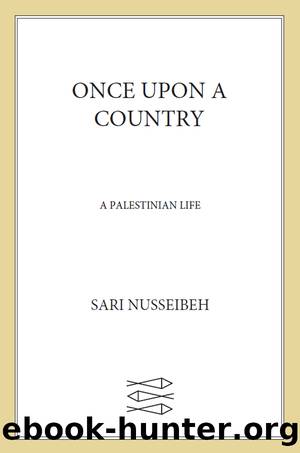Once Upon a Country: A Palestinian Life by Sari Nusseibeh

Author:Sari Nusseibeh [Nusseibeh, Sari]
Language: eng
Format: azw3
Publisher: Farrar, Straus and Giroux
Published: 2015-09-22T00:00:00+00:00
Chapter Nineteen
A Declaration of Independence
FOLLOWING MY NATURAL INCLINATION, I did my best to look and act like the good soldier Schweik, naïve and not entirely of this world. My day job as a coffee shop philosopher both was a pose and reality, a convenient cover and precisely where my heart was. With all the exuberance and excitement, I wanted to call peopleâs attention to the humanism without which our rebellion was doomed to turn into just another Palestinian catastropheâand farce.
In 1987 I was invited to the University of Pavia in northern Italy to deliver a lecture. At the entrance of the university I saw posters festooning trees and buildings proclaiming the merits of our cause. This brought back memories of 1967, when we were the pariahs of the world, and the only avid supporter we came across was an English Nazi. The intifada had turned us into the underdog du jour for the European left.
In Pavia, I chose to give my talk on the predicament of Palestinian prisoners, and my entrée into the subject was the notion of freedom, and how the will was inextricably linked with personal and national identity. I told my audience about my observations of students who had spent long hours in the interrogation cell, and how by refusing to confess, they came out of it with a new sense of self and, often for the first time in their lives, a genuine experience of freedom.
Freedom, I said, isnât some innate quality stamped on our foreheads like a product bar code; nor is it something external like a particular passport or the right amount of money in the bank. Freedom is an expression of the will, and the amount you have of it is in direct proportion to your mastery over fear and egotism. By exercising the will, the individual carves out a distinct identity. There was as much Avicenna as there was of my father in that lecture.
If identity is created and not passively inherited like blue eyes, it admits of degrees. Individuals can have strong identities or almost none. The same holds true for a nation. Like an individual, a nation has to forge its identity through constant acts of the will. As Palestinians, our internal sovereignty and identity consist precisely in freely exercising our will, in defiance of the power employed to crush it. Through an act of the will, our nation can neutralize our jailerâs truncheon and his psychological weapons, and can transform the physical instruments of oppression into symbols of the interrogatorâs utter impotence.
A nation can mysteriously develop a common sense of itself and a common sense of purpose ⦠With this revolutionary consciousness, the national will becomes an instrument with which to achieve inner freedom, and with which to translate this into acts of objective struggle. A nation under occupation, just like a prisoner inside the cell, comes thus to be free through its acts or non-acts.
Download
This site does not store any files on its server. We only index and link to content provided by other sites. Please contact the content providers to delete copyright contents if any and email us, we'll remove relevant links or contents immediately.
| Arms Control | Diplomacy |
| Security | Trades & Tariffs |
| Treaties | African |
| Asian | Australian & Oceanian |
| Canadian | Caribbean & Latin American |
| European | Middle Eastern |
| Russian & Former Soviet Union |
The Secret History by Donna Tartt(19052)
The Social Justice Warrior Handbook by Lisa De Pasquale(12187)
Thirteen Reasons Why by Jay Asher(8893)
This Is How You Lose Her by Junot Diaz(6877)
Weapons of Math Destruction by Cathy O'Neil(6264)
Zero to One by Peter Thiel(5786)
Beartown by Fredrik Backman(5737)
The Myth of the Strong Leader by Archie Brown(5499)
The Fire Next Time by James Baldwin(5431)
How Democracies Die by Steven Levitsky & Daniel Ziblatt(5215)
Promise Me, Dad by Joe Biden(5141)
Stone's Rules by Roger Stone(5081)
A Higher Loyalty: Truth, Lies, and Leadership by James Comey(4954)
100 Deadly Skills by Clint Emerson(4921)
Rise and Kill First by Ronen Bergman(4779)
Secrecy World by Jake Bernstein(4741)
The David Icke Guide to the Global Conspiracy (and how to end it) by David Icke(4701)
The Farm by Tom Rob Smith(4502)
The Doomsday Machine by Daniel Ellsberg(4484)
